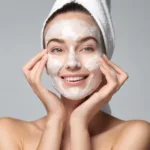12 January 2024
The growing trend of children and tweens demanding premium skincare products raises concerns about the potential risks and consequences of using harsh ingredients at a young age.
This year, parents were surprised to find that their children’s Christmas wish lists included skincare products instead of traditional toys. The influence of social media and the allure of premium skincare brands have led to a rise in young girls as young as eight years old seeking out products designed for adult skin. However, experts warn that these products often contain harsh ingredients that may be unsuitable for children’s delicate skin. As the skincare industry capitalizes on this trend, questions arise about the potential consequences and the need for age restrictions on certain products.
The Influence of Social Media and Generation Alpha
Generation Alpha, born between 2010 and 2023, is the first generation to grow up in a fully digital world. With unbridled access to platforms like TikTok and Instagram, they are exposed to influencer marketing and the glamorization of skincare routines. The desire to emulate their favorite influencers and appear more mature drives the demand for premium skincare products. However, it is important to consider the age-appropriateness of these products and the potential risks they pose to young skin.
The Appeal of Premium Skincare Brands for Children
Children are drawn to the aesthetic appeal of premium skincare brands, with their shimmering pastel and neon packaging. Brands like Drunk Elephant, Glow Recipe, and Sol De Janeiro have captured the attention of young girls, despite being formulated for adult skin. These products often contain active ingredients like retinol, glycolic acid, and vitamin C, which can be too harsh for children’s delicate skin. It is crucial to educate both children and parents about the potential risks associated with using these products at a young age.
Expert Insights on Age-Appropriate Skincare
Dermatologist Sharon Wong emphasizes the importance of tailoring skincare routines to each stage of development. Before the teenage years and the onset of acne, children’s skin is still sensitive and thin. The focus should be on sun protection, protecting the skin barrier, and using hypoallergenic products with minimal fragrances and preservatives. Wong advises against the use of retinol, glycolic acid, and vitamin C in children, as these ingredients can compromise the skin barrier and lead to sensitivity and other skin issues.
The Consequences of Using Harsh Skincare Products
Using harsh skincare products at a young age can have detrimental effects on children’s skin. Over-exfoliating or using active ingredients that are too strong can lead to dry, cracked areas that are vulnerable to infection and sensitivity. Allergic reactions and inflammation are common problems associated with the use of harsh ingredients. It is crucial to understand that children’s skin is already thin and immature, making it more susceptible to damage from these products.
The Role of Skincare Brands and Age Restrictions
As the demand for skincare products among children grows, there is a need for regulation and age restrictions. Dermatologists advocate for stricter guidelines and the involvement of professionals in determining the suitability of certain products for young skin. Age restrictions or warnings on packaging could help parents make informed decisions and protect children from potential harm.
Conclusion: While the fascination with skincare among children and tweens may seem harmless, it is essential to consider the potential risks and consequences of using harsh products at a young age. Dermatologists emphasize the importance of age-appropriate skincare routines focused on sun protection and maintaining a healthy skin barrier. Skincare brands should take responsibility and consider implementing age restrictions or clearer guidelines to ensure the well-being of young consumers. By prioritizing education and safety, we can strike a balance between self-expression, skincare, and the protection of children’s delicate skin.



